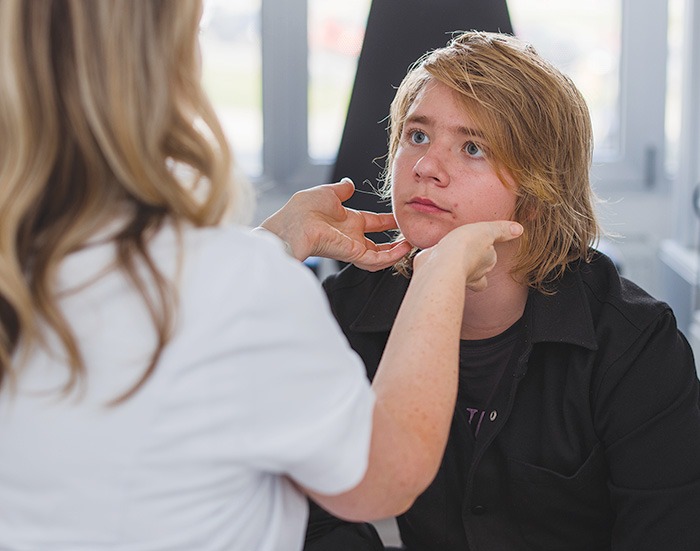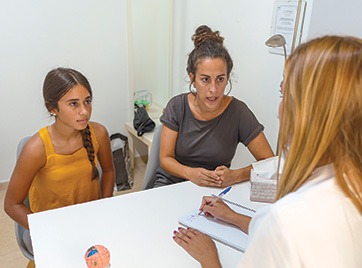Barriers to medicine safety show a health system failing to properly support Australians with a disability, a new report from PSA reveals.
Approximately 4.4 million Australians live with a disability, with many requiring complex medical care. But PSA’s Medicine Safety: Disability Care report points towards a health system that is letting them down when it comes to medicine safety.
The PSA National President Dr Fei Sim launched the report today at PSA22 in Sydney alongside Federal Minister for Health and Aged Care Mark Butler.
The report illustrates the challenges that people with disability face in using medicines safely and effectively, and makes a series of recommendations to improve safety across the disability sector.
Barriers commonly identified by people with disability or their carers include physically inaccessible buildings, discrimination by healthcare professionals, long waiting times, high costs, and a lack of communication between the health professionals who treat them.
“We have major problems with funding in disability care” @ChelseaFelkai #disability #medicinesafety #PSA22SYD pic.twitter.com/arj896oKjf
— PSA (@PSA_National) July 29, 2022
‘The result is a health system that is failing Australians with a disability,’ Dr Sim said.
‘Safety problems with medicines are very common, and mainly relate to timely access to health professionals, inappropriate prescribing, difficulty in taking medicines, and inadequate access to medicine management review services.
‘We need to place a greater focus on medicine safety to help address the health and life expectancy gap in this vulnerable population – as we have been working to achieve for our aged care population.’
Disability care roadblocks
The report launch was followed by a panel session that featured Dr Manya Angley FPS, Genevieve Adamo MPS, Chelsea Felkai MPS and Swati Lele MPS.
The power panel of four women highlighted the state of play for disability care in Australia, and the critical role played by pharmacists.
As Australia’s leading expert in disability-care medicines, Dr Angley contextualised the discussion with some sobering statistics.
‘There are around 350,000 people with severe and profound intellectual disability,’ she said. ‘One issue is the disparity in health outcomes for that population. They die 27 years earlier than the rest of the population – and up to 50% of those deaths are preventable,’ she said.
‘That’s clearly the biggest concern, especially when the Convention of the Rights of People with Disabilities says that every person with a disability has the right to equal access to health care.’
Ms Felkai, PSA NSW Branch President, outlined the major barriers preventing equal access to care, including barriers to physical access in pharmacies and doctors’ surgeries, inadequate funding, and a lack of awareness from the broader healthcare profession around the function and abilities of pharmacists.
‘The aged care sector has a lot of learnings that we can move across into the disability sector,’ she added. ‘But there are also unique aspects to the disability sector that we need to understand to make the right model that fits the sector.’
Ms Adamo, Senior Pharmacist in Poisons Information at the NSW Poisons Information Centre, explained the ease with which errors in medicine misadventure can occur, while Ms Lele, who is both a pharmacist and a mother, drew on personal experience to illustrate the challenges involved in taking care of family members with a disability.
She and her husband provide around-the-clock care for their daughter Geeta, who has severe intellectual disability alongside mobility issues and epilepsy.
Speaking to Australian Pharmacist prior to PSA22, Dr Angley explained the difficulty in conducting any large-scale research about medicine use in this cohort when it is not possible to link data sets.
‘Intellectual disability is not even coded, or routinely recorded as a diagnosis,’ she said.
Any data examined retrospectively, she explained, won’t be complete and comprehensive.
‘We cannot even tell what proportion of people with intellectual disability are prescribed antipsychotics because that information about intellectual disability is lacking.
‘We just don’t know how many medication reviews occur in this cohort, only that anecdotally it’s very low.’
Dr Angley believes pharmacists need to be empowered to report potential abuse via chemical restraint, and better pathways are needed to report inaction.
Core recommendations
The report is the fifth in PSA’s medicine safety series, which previously also addressed medicine safety in aged care and in rural Australia.
The PSA has outlined four core recommendations for ensuring disability care is given the attention it needs, and ensuring equity of access to essential medicines for those with a disability:
- Ensure disability service providers have access to quality use of medicine (QUM) services by funding on-site pharmacists’ roles in disability provider organisations.
- Enable pharmacists to register as providers under the National Disability Insurance Scheme (NDIS) to increase access for people with disability to medication management services tailored to their needs, referred by suitably qualified NDIS service providers.
- Allow suitably trained pharmacists to administer vaccines and other injectable medicines to people with disability in a setting of their choice, including their home.
- Enhance the set of quality indicators for disability care to facilitate continuous improvement of medicine safety initiatives.
These services must be person-centred and provided in the manner most appropriate to the person with disability, such as telehealth and assistive technologies.
Dr Sim said that action to improve standards of medicine safety for those with a disability in Australia is an immediate priority.
‘A greater focus on medicine safety is needed to help address the health and life expectancy gap for people with a disability,’ she explained.
‘Pharmacists must be recognised as an essential service provider for people with special medicine needs.’
Download PSA’s Medicine Safety: Disability Care report here.



 Pharmacists have always prescribed, but they have the potential to prescribe much more
Pharmacists have always prescribed, but they have the potential to prescribe much more



 Sponsorship information
Sponsorship information


 Talking to patients who have questions
Talking to patients who have questions





